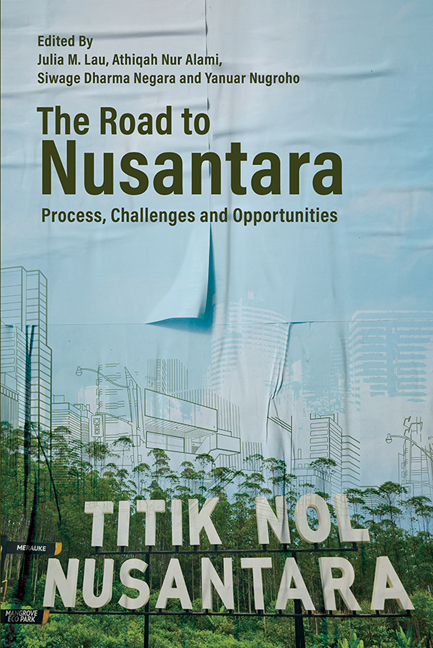Book contents
- Frontmatter
- Contents
- List of Figures
- List of Tables
- Foreword
- Foreword
- The Contributors
- Glossary
- Introduction: The Road to Nusantara—Process, Challenges and Opportunities
- PART I PROCESSES AND PATHWAYS TOWARDS NUSANTARA
- PART II CHALLENGES IN DEVELOPING NUSANTARA
- PART III OPPORTUNITIES FOR NUSANTARA
- Conclusion: Shaping Nusantara
- Index
7 - Identifying Potential Social Challenges in IKN: Perspectives of Civil Society and Villagers in East Kalimantan
Published online by Cambridge University Press: 01 March 2024
- Frontmatter
- Contents
- List of Figures
- List of Tables
- Foreword
- Foreword
- The Contributors
- Glossary
- Introduction: The Road to Nusantara—Process, Challenges and Opportunities
- PART I PROCESSES AND PATHWAYS TOWARDS NUSANTARA
- PART II CHALLENGES IN DEVELOPING NUSANTARA
- PART III OPPORTUNITIES FOR NUSANTARA
- Conclusion: Shaping Nusantara
- Index
Summary
INTRODUCTION
In March 2022, several activists applied for a Constitutional Court judicial review of Indonesia's Law on the State's Capital (UU IKN). The law had been passed by the legislature and signed into law by President Joko Widodo in February 2022. The applicants included the Head of Legal Affairs of Muhammadiyah, Busyro Muqoddas, the Indigenous Peoples’ Alliance of the Archipelago (Aliansi Masyarakat Adat Nusantara, AMAN), the Mining Advocacy Network (Jaringan Advokasi Tambang, JATAM),3 the Indonesian Forum for Living Environment (WALHI) and the people of North Penajam Paser district, whose residential area is the designated core zone of the new capital city, Nusantara.
The applicants claimed that the government had hastily passed the law without clearly stipulating the rights of the local residents; that the Parliament's deliberation of the law had been overly brief, taking only seventeen days from first reading to its passage, which meant that there had been little to no public participation in the deliberations; and that this lack of public participation meant that the IKN Law conflicted with Laws No. 12/2011 and 15/2019 on the Creation of Laws. The applicants, therefore, claimed that the law-making process had not sufficiently considered the constitutional rights of the affected indigenous communities in the designated IKN area at a time when the communities were struggling with the COVID-19 pandemic and economic difficulties.
Unfortunately, the Constitutional Court rejected this application due to the technical reason that it was submitted on the forty-sixth day after the issuance of UU IKN, a day past the stipulated timeframe that applications for judicial review must be submitted within forty-five days after a law is first gazetted.
The fact that many prominent civil society organizations (CSOs) had banded together to voice their concerns about the IKN Law has highlighted Indonesian civil society's stance against the IKN megaproject and its potential adverse impact on a range of issues and individuals. This chapter will explore civil society's concerns through the examples of AMAN's and JATAM's advocacy. Due to civil society's traditional position between “state” and “society”, CSOs usually take on the task of articulating society's concerns against what they perceive as potentially unfair or detrimental state policies.
- Type
- Chapter
- Information
- The Road to NusantaraProcess, Challenges and Opportunities, pp. 150 - 172Publisher: ISEAS–Yusof Ishak InstitutePrint publication year: 2023

